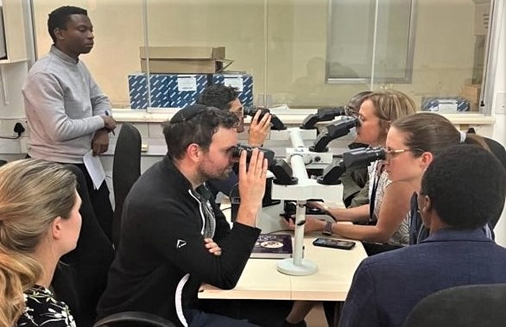NHLS TEACHING AND TRAINING
The Division of Haematology participates in the teaching of undergraduate and postgraduate students at the UCT Health Sciences Faculty. Registrars and consultants participate in undergraduate teaching and training by facilitating and delivering class lectures and practical lectures focusing on blood disorders, in various modules of the UCT MBChB program.
The division has 6 HPCSA accredited registrar posts for medical doctors to pursue specialist training in Haematopathology. Clinical Haematology fellows also spend at least 12 months training in the laboratory within the UCT Department of Pathology, as part of their certification. In addition, Clinical Pathology trainees rotate through the division for 16 months of their training. Regular experiential teaching and microscope tutorials are offered to registrars in Haematopathology and others rotating through the laboratory. Regular journal clubs, seminars and group teaching are held in the division. Interdepartmental haematology pathology meetings are held biannually with academic staff from Tygerberg Hospital and the Red Cross War Memorial Children's Hospital. Attendance, presentation and participation in local and international congresses is expected and actively encouraged.
SPECIALIST TRAINING
Medical doctors may specialise as registrars in the department via the completion of a fellowship obtained from the College of Medicine of SA and a MMed (UCT) degree which includes a compulsory research mini-dissertation required for specialist registration.
REGISTRAR ROTATIONS
Haematology Pathology Registrars are based at NHLS Groote Schuur Hospital. They gain experience in Clinical Haematology by working in the GSH Clinical Haematology division for 2 months, Western Cape Blood Transfusion Service for 3 months, and Red Cross Children’s Hospital for a minimum of 3 months during their training. A number of other registrar rotations are accommodated including Clinical Pathology and Clinical Haematology. Each of these rotations is completed over a different time period but training is offered in all aspects of haematology which includes morphology, bone marrow analysis, coagulation, flow cytometry, haemoglobinopathy testing and molecular analysis. All registrars rotate through both Groote Schuur Hospital and Red Cross Hospital and thus have exposure to both adult and paediatric haematology. They are also required to spend varying time periods at the Western Province Blood Transfusion Services.
MASTER'S DEGREE
Masters in Medicine (MMed)
Pathology (Haematological)
[MM001PTY10] [SAQA ID:214190]
Convener: A/Prof Jessica Opie (Department of Pathology)
Pathology (Haematological)
[MM001PTY10] [SAQA ID:214190]
Convener: A/Prof Jessica Opie (Department of Pathology)
Structure and duration of training
The NHLS funds registrar contracts for a minimum of four years. The program covers training in all aspects of haematological pathology including paediatric haematology, molecular haematology, haemostasis and thrombosis, blood transfusion, flow cytometry, and diagnosis of haematological malignancies. The national CMSA examinations are written in Haematology Pathology. Registrars must be registered as postgraduate students with UCT. The completion and passing of a minor dissertation is required prior to registration as a specialist in Haematology Pathology with the HPCSA.
Curriculum outlines
| Code | Course | NQF Credits (Total: 180) | HEQSF Level |
|---|---|---|---|
| PTY7024W | MMed Haematological Pathology Part 1 | 60 | 9 |
| PTY7021W | MMed Haematological Pathology Part 2 | 60 | 9 |
| PTY7022W | Haematological Pathology Minor Dissertation | 60 | 9 |

|
|
A/Prof Jessica Opie teaching at the multi-headed microscope in C17 NHLS laboratory, Groote Schuur Hospital. 2023. |
The research laboratory is located on the Faculty of Health Sciences (Medical School) campus and is well-equipped to support undergraduate and postgraduate pathology and science students.
DOCTOR OF PHILOSOPHY (PhD)
Specialisation: Haematology
Qualification Code: MD001
Academic Plan Code: PTY11
NQF credits: 360 at HEQSF level 10
Qualification Code: MD001
Academic Plan Code: PTY11
NQF credits: 360 at HEQSF level 10
Course outline: This is a degree by doctoral thesis of up to 80,000 words in length.
Assessment: The thesis is examined by three examiners external to the university.
Rules for this degree are published in Handbook No 3 of the series.
Assessment: The thesis is examined by three examiners external to the university.
Rules for this degree are published in Handbook No 3 of the series.
MASTER'S
MSc (Medicine) by dissertation
[MM095][SAQA ID: 3409]
Specialisation: Haematology
Qualification Code: MM095
Academic Plan Code: PTY11
[MM095][SAQA ID: 3409]
Specialisation: Haematology
Qualification Code: MM095
Academic Plan Code: PTY11
The Master’s program consists of a laboratory project, culminating in the submission of a dissertation. The average length of this degree is 2 years.
HONOURS
BSc(Med)(Hons) - within the Department of Integrative Biomedical Sciences
[MH002IBS04]
Discipline: Medical Biochemistry
[MH002IBS04]
Discipline: Medical Biochemistry
A student shall during one academic year of full-time study attend and by examination complete an honours programme in the discipline.
For further information on the above Degrees, refer to the Faculty of Health Sciences Handbook.
For further information on the above Degrees, refer to the Faculty of Health Sciences Handbook.
Please contact A/Prof Shaheen Mowla and A/Prof Karen Shires concerning potential projects that are on offer.